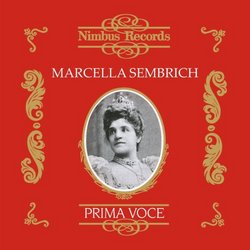| All Artists: Antonio Scotti, Gaetano Donizetti, Stanislaw Moniuszko, Gioachino Rossini, Giuseppe Verdi, Vincenzo Bellini, Ambroise Thomas, Friedrich von Flotow, Johann II [Junior] Strauss, Michael Arne, Luigi Arditi, Henry Rowley Bishop, Reynaldo Hahn, Franz [Vienna] Schubert, Frederic Chopin, Scottish Traditional, Marcella Sembrich, Emilio de Gogorza Title: Marcella Sembrich Members Wishing: 0 Total Copies: 0 Label: Nimbus Records Release Date: 6/15/1999 Genres: Dance & Electronic, Special Interest, Pop, Classical Styles: Vocal Pop, Opera & Classical Vocal, Historical Periods, Classical (c.1770-1830), Modern, 20th, & 21st Century Number of Discs: 1 SwapaCD Credits: 1 UPC: 710357790126 |
Search - Antonio Scotti, Gaetano Donizetti, Stanislaw Moniuszko :: Marcella Sembrich
 | Antonio Scotti, Gaetano Donizetti, Stanislaw Moniuszko Marcella Sembrich Genres: Dance & Electronic, Special Interest, Pop, Classical
|
Larger Image |
CD Details |
CD ReviewsWelcome collection of Marcella Sembrich's work Steven A. Peterson | Hershey, PA (Born in Kewanee, IL) | 03/07/2007 (4 out of 5 stars) "Marcella Sembrich recorded the cuts on this CD in her mid- and late 40s. Thus, obviously, we are not hearing at in her best voice. Also, this is an old-time acoustic recording; hence, the quality is not what would come later. It is fun to listen to one of the leading sopranos of the late 19th and early 20th centuries. But it's hard to know how good she really was, given the technology of recording and the fact that she was well into her 40s (although her voice is still rich).
A sampling. . . . "Bal raggio lusinghier" (from Rossini's "Semiramide") is well sung. Her voice shows agility. The ornamentation is somewhat different than what we are used to hearing in recent decades. Her voice is rich sounding. She shows a mediocre trill before concluding with a nice high note. "Ah, fors e lui. . .Sempre libera," from Verdi's "La Traviata" is a showpiece. "Ah, fors e lui" is smoothly sung, although there is a rough note somewhat before "Sempre libera." It may be the technology (I don't know). There is another mediocre trill before "Sempre libera." The latter is sung at a quick pace and Sembrich hits high notes well. The ending is somewhat less musical than what came before. One of the segments of "The Mad Scene" from Donizetti's "Lucia di Lammermoor" is "Ardon gl'incensi." This is smoothly sung, with some occasional harsh sounding notes (again, is this the technology or the voice?). "Una voce poco fa," from "Il Barbiere di Siviglia," features a couple harsh high notes. There also seems to be something of a break from her lower to her middle and upper register. The cabaletta is taken at a delightfully quick pace. In some florid passages, the notes sort of "mush" into one another in a way that I do not find particularly attractive. Strauss' waltz, "Fruhlingstimmen," is sung with gusto. The singer seems to be having fun on this cut. Finally, "Ah! Non giunge" from Bellini's "La Sonnambula." This is the oldest cut on the CD (recorded in 1904). The recording is of noticeably poorer quality than other selections. Sembrich sings at a quick pace. Some of the higher notes are a bit harsh sounding. All in all, this is a welcome introduction to one of the major figures of the late 19th and early 20th centuries. Kudos to such companies as Nimbus Records for making these singers and their work available to contemporary audiences. " |

 Track Listings (21) - Disc #1
Track Listings (21) - Disc #1